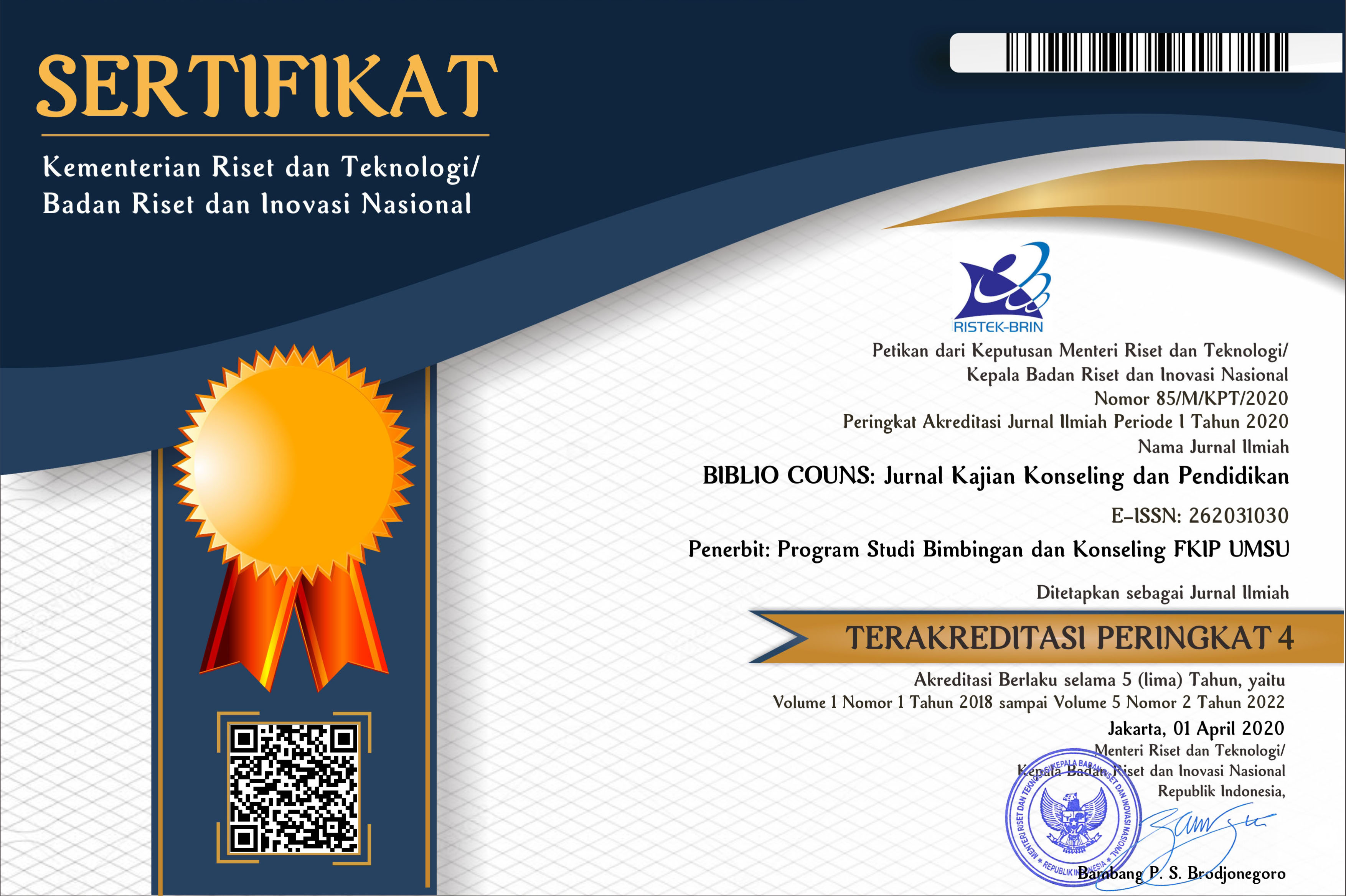The Effectiveness of the Token Economy to Reduce Student Academic Procrastination
Abstract
This research is based on the problem of student academic procrastination in online learning during the current covid-19 pandemic. This study aims to describe the results of empirical tests regarding the effectiveness of the token economy strategy to reduce students' academic procrastination. A total of 15 students of class IX at SMPN 8 were used as samples in this study. The instrument used is the PAS Scale. Data analysis includes descriptive analysis, analysis requirements test with normality and homogeneity tests, and hypothesis testing with T-test. The results of the study were the level of student academic procrastination before being given treatment was 53.3%, and after being given treatment decreased by 40%. The T-test obtained a T arithmetic value of 4,567 with sig(2-tailed) 0.000 < 0.05. the conclusion is the token economy strategy is effective to reduce student academic procrastination.
Keywords
Full Text:
PDFReferences
Akram, A., Fu, C., Li, Y., Javed, M. Y., Lin, R., Jiang, Y., & Tang, Y. (2019). Predicting Students Academic Procrastination in Blended Learning Course Using Homework DOI 10.18502/kss.v4i15.8220 Page 321 ICoPsy Submission Data. IEEE Access, 7, 102487102498. https://doi.org/10.1109/access. 2019.2930867
Ayllon, T. (1999). How to Use Token Economy and Point Systems. 2nd ed. Austin, Texas: Pro-Ed.
Borekci, C., Uyangor Borekci, C., & Uyangor, N. (2018). Family attitude, academic procrastination and test anxiety as predictors of academic achievement. International Journal of Educational Methodology, 4(4): 219-226.
Burka, J. B. & Yuen, L. M. (2008). Procrastination: Why You Do It, What To Do About It Now. Cambridge: Da Capo Press.
Choi, J,N., & Moran, S,V. 2009. Why not procrastinate? Development and validation of a new active procrastination scale. J Soc Psychol. Vol. 149(2): 195-212.
Chu, A. H. C., & Choi, J. N. (2005). Rethinking Procrastination: Positive Effects of Active Procrastination Behavior on Attitudes and Performance. The Journal of Social Psychology, 145(3), 245-264.
Eford, B.T. 2015. Forty Techniques Every Counselor Should Know / Bradley T. Erford.-Second Edition. Hoboken: Pearson Education, Inc
Fahrudin, A. (2012). Teknik ekonomi token dalam pengubahan perilaku klien. Informasi, 17(03)
Farrington, D P., & Welsh, B. C. (2005). Randomized experiments in criminology: What have we learned in the past two decades? Journal of Experimental Criminology , 1, 9 38.
Ferarri, J. R. (2001). Procrastination as self regulated failure of performance: effect of cognitive load, self awareness, and time limits on working best under pressure. European Journal of Personality. 15:391-406. DOI: 10.1002/per.413.
Ferrari et al., (1995). Procrastination and Task Avoidance. Springer Science+Business Media : New York.
Ghufron, M. N., & Risnawati S. R. (2010). Teori-teori Psikologi. Jogjakarta: Ar-Ruzz Media.
Hadi, Purwaka. (2005). Modifikasi Perilaku. Jakarta: Depdiknas.
Irawan, A.W., Dwisona, & Lestari, M. 2020. Dampak Psikologis Siswa terhadap Pembelajaran Online Saat Pandemi COVID-19. Jurnal KONSELI. Vol 7(1) https://doi.org/10.24042/kons.v7i1.6389
Marantika, F. D. 2020. Hubungan antara Regulasi Diri dan Harga Diri dengan Prokrastinasi Akademik pada Mahasiswa yang Melakukan Pembelajaran Daring. Skripsi. Universitas 17 Agustus 1945 Surabaya.
Moonaghi, H. K., Baloochi, T., & Bcydokhti. (2017). Academic procrastination and its characteristics: a narrative review. Future of medical education journal, 7(2).
Mujiyati. (2015). Mereduksi prokrastinasi akademik mahasiswa melalui teknik token economy . Jurnal Fokus Konseling, 1 (2), 142-150.
Nelyahardi & Wahyuni, H., 2021. Guru BK perempuan Jawa-Melayu dan laki-laki Batak lebih mempengaruhi self-disclosure konseli. Teraputik. Volume 4, Number 3, pp. 415-428
Qian, L. & Fuqiang, Z. (2018). Academic stress, academic procrastination and academicperformance: a moderated dual-mediation model. Journal on Innovetion and Sustainability. 9 (2). ISSN: 2179-3565.
Rigianti, H. A. (2020). Kendala Pembelajaran Daring Guru Sekolah Dasar di Banjarnegara. Elementary School: Jurnal Pendidikan Dan Pembelajaran Ke-SD-An, 7(2).
Saracaloglu, A.S., Dincer, B., dan Ceren S.G. (2018). The relationship between music teacher candidates academic and general procrastination tendencies and test anxiety. Journal of Education and Training Studies, 6(9): 174-183.
Schraw G, Wadkins T, Olafson L. 2007. Doing the things we do: A grounded theory of academic procrastination. J Educ Psychol. Vol. 99(1): 12.
Setiyowati, A,J., Triyono, & Rachmawati, I., 2020. Academic Procrastination of High School Students in East Java. Psikopedagogia Jurnal Bimbingan dan Konseling. Vol.9, No.1. DOI: 10.12928/psikopedagogia.v9i1.17907.
Shadish, W. R., Cook, T. D., & Campbell, D. T. (2002). Experimental and quasi-experimental designs for generalized causal inference. Belmont, CA: Wadsworth Cengage Learning.
Steel, P., & Klingsieck, K. B. (2016). Academic Procrastination: Psychological Antecedents Revisited. Australian Psychologist, 51(1), 3646. https://doi.org/10.1111/ ap.12173
Suhadianto., Arifiana, I, Y., Rahmawati, H., , Hanurawan, F., & Eva, N. 2021. Stop Academic Procrastination During Covid 19: Academic Procrastination Reduces Subjective Well-Being. in International Conference of Psychology, KnE Social Sciences, pages 312325. DOI 10.18502/kss.v4i15.8220.
Yusuf, A. M. 2013. Metode Penelitian Kuantitatif, Kualitatif & Penelitian Gabungan. Jakarta: Prenada Media Group.
DOI: https://doi.org/10.30596/bibliocouns.v5i2.10543
Refbacks
- There are currently no refbacks.
Biblio Couns: Jurnal Kajian Konseling dan Pendidikan
Universitas Muhammadiyah Sumatera Utara
Kampus Utama
Jl. Kapten Muchtar Basri No.3, Glugur Darat II,Medan
Sumatera Utara-20238
E-mail: jbcons@umsu.ac.id



